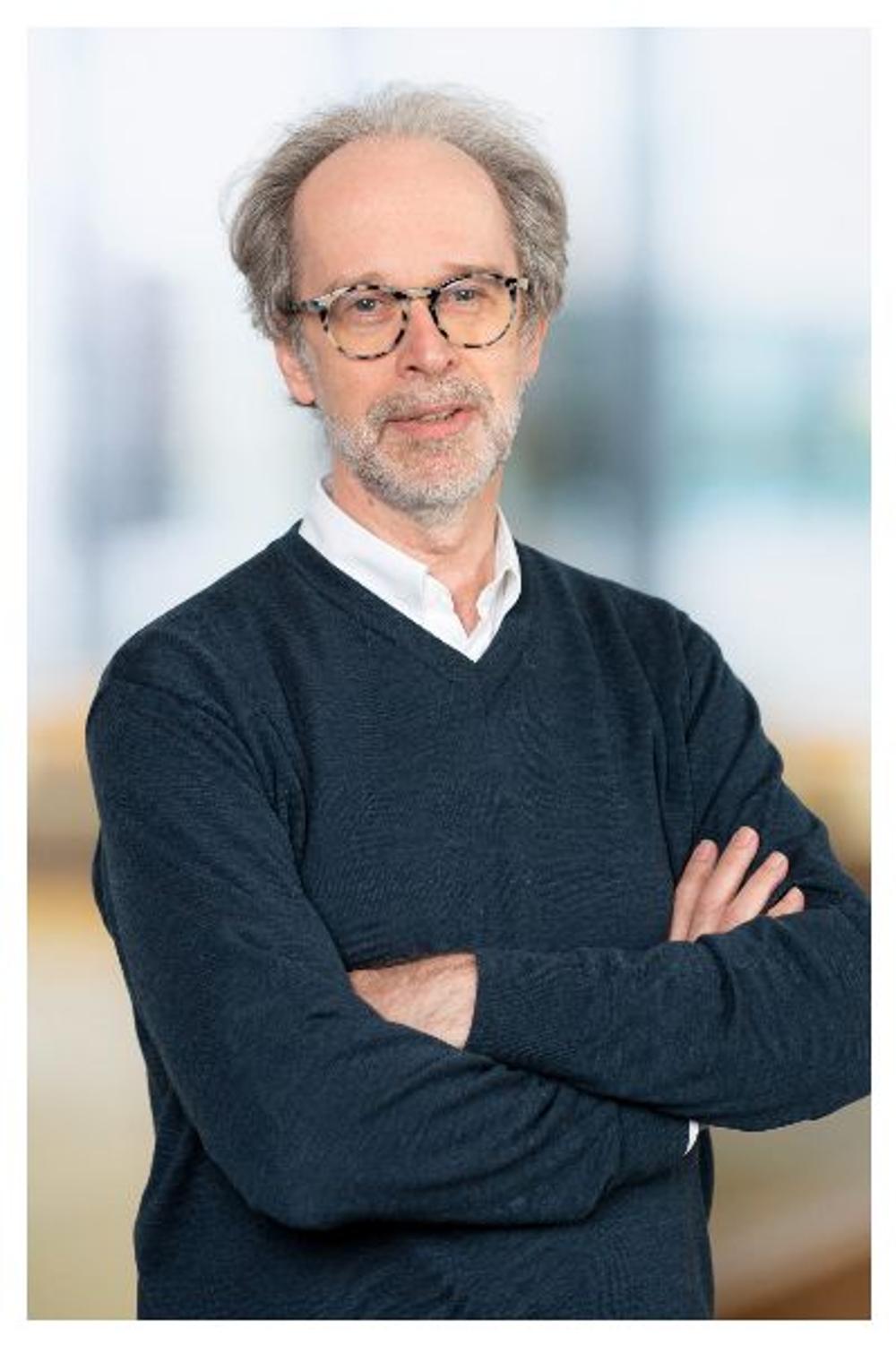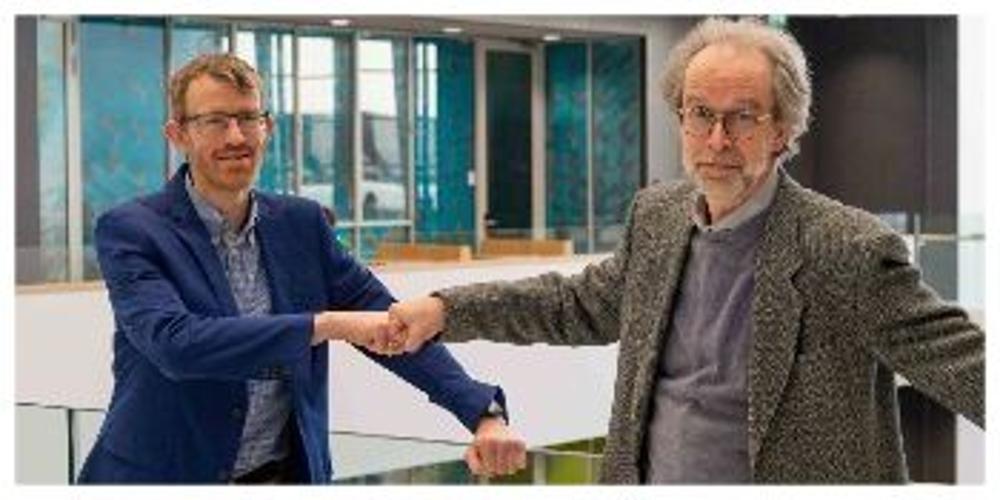|
|

Farewell to Bernard Dam due to retirement |
In 2009, he was hired at TU Delft Chemical Engineering and pretty soon the seeds were planted for the founding of e-Refinery. Together with John Nijenhuis and Wim Haije, he set up a project to realise within TU Delft a multidisciplinary approach to electrochemical conversion processes for the production of fossil-free fuels and feedstock materials. On 15 November, he will officially retire with an oration. We spoke to him about his years at TU Delft.
He came in as someone who wanted to develop research in functional materials science and especially in the field of hydrogen devices. Together with prof. Roel van de Krol (now Technische Universität Berlin), he wanted to form a section that would focus on the development of devices for the hydrogen economy, such as hydrogen sensors and photochemical water-splitting devices.
Bernard: "I thought: Delft, there is a lot of material-related research being done there, all related to the subject of energy, so from the very beginning I was concerned with: How can we create coherence, how can I work on something together with as many people as possible in a larger context, with more impact than what I could achieve by myself individually?" Several attempts followed with energy storage or solar conversion as the theme. But none of them held up."

Energy transition
Meanwhile, things were also changing at MECS (Materials for Energy Conversion and Storage). Roel van de Krol left and Wilson Smith succeeded him. The latter wanted to work more in the direction of CO2 conversion, which led to Bernard becoming involved in consultations on the energy transition. From a number of such meetings that also involved people from Process & Energy, the idea of e-Refinery was born.
Bernard: "At one point, John Nijenhuis and Wim Haije came to my room and they said: Well, we should do something now and we think you should pull that off. So that was the beginning of e-Refinery.
Looking back, what has been very important for me is that through the discussions I got through what Chemical Engineering actually is. And that I also gained insight into the enormous scope of it, from social implementation on the one hand to catalysis of chemical reactions on the other. The importance of that very large field became clear to me thanks to the e-Refinery discussions. So it was there that I actually learned what chemical engineering is all about. And I developed an appreciation for that field as a result.
Look: The ChemE department consists of three sections: There is an (organic) chemistry leg, an engineering leg and a materials leg. At least that's how it was when I came. I was obviously in the materials leg and materials research can be seen as preconditional for chemical engineering, because at some point you find out what the limiting factors, the showstoppers are to get a particular process implemented. Some of those showstoppers are new, functional materials that need to be developed. But if I had limited myself to these materials (and in terms of research, I have always done that), I would have only had a very limited view of the field of chemical engineering.” |
|
|
|
| "At one point, John Nijenhuis and Wim Haije came to my room and they said: Well, we should do something now and we think you should pull that off. So that was the beginning of e-Refinery." |
|
|
|
|
|
So the discussions on e-Refinery really helped him understand what chemical engineering is all about.
Bernard: "Yes. The questions we asked ourselves were actually twofold. What needs to happen to get the chemical industry fossil-free by 2050? And what expertise is available in Delft to make a constructive contribution to its realisation? By talking about it, the picture gradually became clear. In addition, in the start-up phase we had a number of meetings with industry and scientists, to talk through what is needed and what we can do in our research to make it happen.
 The e-Refinery institute The e-Refinery institute
e-Refinery did not immediately become an institute. We first spent another year or two as a club of enthusiasts, where there was no structure, hardly any support, nothing."
e-Refinery only became an institute when Paulien Herder joined, she knew how to pull the right strings. Paulien was also initially put in charge of the institute, but when she became department head of ChemE, this task fell to Bernard.
When Paulien became dean of the TNW faculty, he first temporarily and later permanently became her replacement as ChemE department head. Because of the latter appointment, Bernard resigned his directorship of e-Refinery, but otherwise remained closely involved in the day-to-day management of the institute.
Bernard: 'Resigning that position was mainly to prevent any conflicts of interest in the long term. I wanted to have my hands free and not get some kind of 'caps' problem."
With this track record, we absolutely cannot ignore the imprint Bernard has left on e-Refinery, but he himself says he stands above all for genuine commitment from the people who participate in e-Refinery.
Bernard: "What I hate are people who are on a list or on a website who then don't participate. We want to be more than a signboard. We must have added value. We should not just be a kind of billboard for TU Delft, but really want to contribute to the infrastructure and research in the Netherlands. We really want to help green the chemical industry. That has to come first. And everything else is secondary to that.
I think e-Refinery is also a good example that strategic thinking is important in organising research. We said early on that a defossilized chemical industry is the future. We are going to organise ourselves accordingly, even without funding, with the full conviction that money will come. I think the same approach is also relevant for the ChemE department, but in a broader context: we have to decide for ourselves what we want and where we will be in ten years' time, and devise a path towards it. To thereby structure our hiring policy. This is a message that I strongly promoted as department chair." |
|
|
|
| "We really want to help green the chemical industry. That has to come first. And everything else is secondary to that." |
|
|
|
|
|

Photo: Start eChem collaboration with TNO (photo Guus Schoonewille)
It should come as no surprise that his fond memories of e-Refinery and ChemE are in this vein.
ChemE
Bernard: "At ChemE, I am most pleased that the department was able to formulate a strategy. What I like most about e-Refinery is that we as individuals have been able to work together very constructively, across the boundaries of disciplines. That we have shown that it can be done. In different faculties, with different levels of knowledge, still being able to think constructively about the future together."
And what does he think the future of e-Refinery looks like?
Bernard: "I still dream of a 100 kWatt lab. A lab where one investigates and demonstrates a complete conversion system on a certain scale. From CO2 to hydrocarbons. We call it 100 kWatt but it is a complex system consisting of a large number of elements that all have to work together to achieve a complete conversion process. That is still my dream. A lab that I think is necessary to be able to convince industry of the feasibility of a certain approach. But more on that in my oration.
As for me personally, I will continue working as a guest for some time and I still have some PhD students, but my main focus will be to return to hydrogen sensor research. I want to continue that research together with Lars Bannenberg. For that, I want to come to the lab one or two days a week. And with a hospitality appointment for five years, there is some room. And at home, I will be busy with music, history and philosophy."
The exit/farewell speech will take place on November 15, at 15:00 hrs in the TU Aula (Mekelweg 5, Delft).
Please subscribe here. |
|
|
|
|
| |
|
|
|